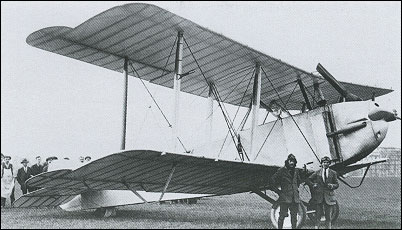|
| The two-seater P2 Seabird biplane was designed in
1919 by J. A. Peters for the Atlantic competition, but
failed to make an impact. Only two were built, distinguished
by rear undercarriage radius rods on one, and
front radius rods on the other.
| Colin Holcombe, e-mail, 27.10.2020 13:14 Hi
I am currently writing a book about the 1919 Air race from Britain to Australia and would like to use the image of the Alliance Endeavour G-EAOX.
Do you own the copyright on this image? and if so what is your policy regarding its use.
Regards Colin Holcombe reply | | Barry, 15.06.2016 12:42 The Alliance Aeroplane Company had license built aircraft in the First World War and afterwards decided to enter the civil market. The Daily Mail offered a £10,000 prize for the first trans Atlantic crossing and the designer J A Peters paid a £100 entry fee to the Royal Aero Club on the 17th April 1919. The plane (G-EAGL- lower picture) did not enter the race but did fly a trial flight from London to Madrid in record time of just under eight hours.
The second Seabird (G-EAOX) which suffered the fatal crash described by Vic Martin put an end to the Alliance company which was wound up in 1920.
Crew 2 in enclosed cabin
Power plant 1 x 450 h.p Napier Lion liquid cooled engine
Span 53'0" Length 33'6" Wing area 700 sq ft
Empty weight 2,600 lb Gross weight 7,400 lb
Max speed 140 mph Range 3,000 miles reply | | David Varvel, e-mail, 18.03.2016 00:05 Hi
I am interested in the aircraft and the Alliance Company. My father worked there during 1917-1919 and I have several photos of the plane with him as well. What I am most interested to see is if there are any drawings of the plans of the P2 as I would like to build a model. Please email me if you would like to swap information.
Regards David reply | | iAN, e-mail, 18.03.2015 10:36 Yes I am making a short film on Lt James Stuart leslie Ross who was killed and have extensivive information on him and the incident - please feel free to contact me reply |
|
| | Eriktheredd, 26.11.2012 21:44 The aircraft in the picture only lasted a month, registered 23 /10 /1919 and either destroyed or withdrawn from use on ? /11 /1919 reply | | Mike Nelmes, e-mail, 16.06.2010 16:52 Hi Vic Martin, there's a chapter on the incident in the book "Australia's Greatest Air Race" by Nelson Eustice (1969), re-published in 2008 by New Holland. I bought a copy last month from www.shop.abc.net.au. I can't now find it mentioned there, but you could email them. Cheers, Mike Nelmes, Australia. reply | | Vic Martin, e-mail, 08.12.2009 12:51 The virtually identical Alliance Endeavour was an entrant in the England to Australia air race of 1919. The aircraft took off from Hounslow on the morning of 13th November 1919, but crashed a few miles away in an orchard near Surbiton Cemetery. Apparently the weather wasn't good, or there was a problem with the aircraft, because the aircraft was heading back towards Hounslow when it was seen spinning out of low cloud. Both pilots, Captain R.M. Douglas and Lieutenant J.L. Ross, were both killed in the accident.
Shortly before the record attempt, the aircraft had been badly damaged in a landing accident, requiring extensive repairs to be undertaken. The enquiry into the accident was irregular and some people thought that there was some kind of 'cover - up' by the Alliance Aircraft Company. They were however exonerated of all blame together with Napiers, whose 450hp Lion engine powered the aircraft. Does anyone have any more information regarding this fascinating subject? I've trawled around on the internet, but, so far have been unable to find any more information about the accident. I'd be really interested to learn more about what happened that day in 1919, just down the road from where I live.
Hoping you can help
Vic Martin reply |
|
Do you have any comments?
|
| 
All the World's Rotorcraft |



 Vic Martin
Vic Martin



Hi Ian, Many years later I have re-visited this page and saw your reply. How I missed it back in 2015 I cannot imagine. If you are still interested in James Stuart Leslie Ross can you please contact me? I have a copy of the Ross Family Papers from the NSW State Library which may be of interest to you. Regards David Varvel.
reply